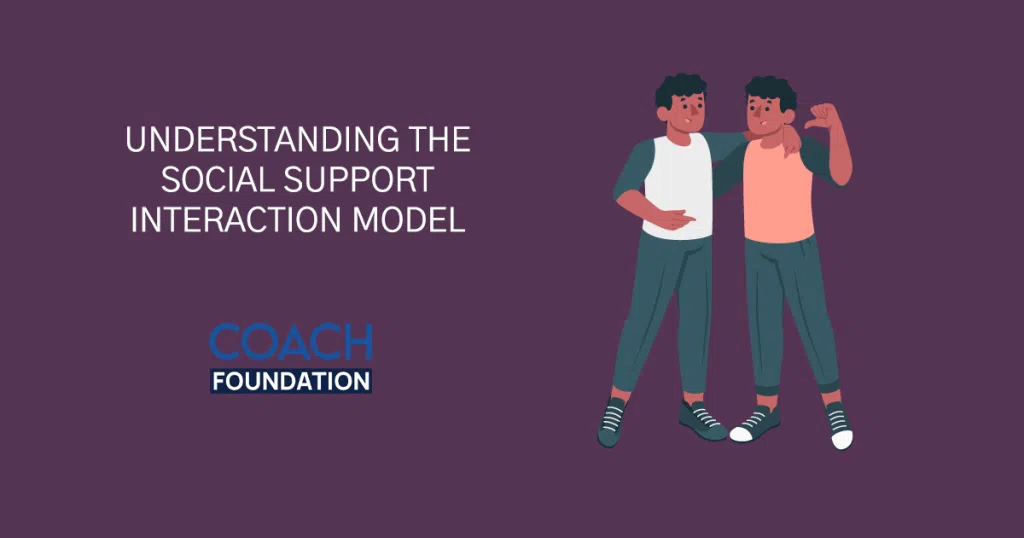Blog » Coaching Models and Techniques » Understanding The Social Support Interaction model
Understanding The Social Support Interaction model
The social support interaction model is a theoretical framework that helps explain the dynamic interaction between social support and individual coping mechanisms. It provides a conceptual basis for understanding the various ways in which social support can influence an individual’s ability to cope with stressors and promote their well-being.

According to the model, social support entails a variety of services that people offer one another in times of stress. These functions can be emotional, informational, instrumental, or appraisal-based.
The provision of social support can have a significant impact on an individual’s ability to cope with stressors and promote their well-being.
In this article, we shall learn how the model works, its core components, types, outcomes, and some frequently asked questions.
- Understanding The Social Support Interaction model
- What is the Social Support Interaction model?
- How does the Social Support Interaction model work?
- Core concepts of Social Support Interaction Model
- Types of Social Support
- Social Support Outcomes:
- Components of Social Support Interactions:
- Applying Social Support Interaction Model to Life Coaching:
- Conclusion
- Frequently Asked Questions (FAQs)
What is the Social Support Interaction model?
The social support interaction model is a theoretical framework that explains the complex interaction between social support and individual coping mechanisms.
It provides a conceptual basis for understanding how social support can influence an individual’s ability to cope with stressors and promote their well-being.
The model suggests that social support can be provided in different ways, including emotional, informational, instrumental, and appraisal-based support.
The provision of these different types of social support can have a significant impact on an individual’s ability to cope with stressors.
If you understand better with visuals, here’s an excellent video to help you learn!
How does the Social Support Interaction model work?
The social support interaction model works by providing a theoretical framework for understanding how social support can influence an individual’s ability to cope with stressors.
It proposes that social support can be provided in different ways and that the provision of social support can have a significant impact on an individual’s ability to cope with stressors.
The model suggests that the provision of social support can improve an individual’s coping ability, reduce stress levels, enhance well-being, and improve health outcomes.
The model also proposes that the interaction between social support and individual coping mechanisms is dynamic and can change over time.
Core concepts of Social Support Interaction Model
The Social Support Interaction Model serves as a powerful paradigm that elucidates the dynamics of supportive relationships and their impact on personal growth and well-being. This model encompasses a set of core concepts that, when understood and applied in the context of life coaching, have the potential to transform the coaching relationship and unlock the full potential of clients. Let’s explore these core concepts in depth:
1. Exchange of Support
At the heart of the social support interaction model is the concept of exchange—an interplay between individuals involving the giving and receiving of support. In the realm of life coaching, this concept emphasizes the importance of creating a reciprocal and collaborative partnership between the coach and the client.
2. Emotional Support
Emotional support represents a fundamental aspect of the social support interaction model. It encompasses providing empathy, understanding, and validation to individuals during challenging times or moments of uncertainty. In the realm of life coaching, the ability to offer emotional support is crucial.
3. Exchange of Support
Instrumental support refers to the practical assistance and resources provided to individuals in need. In life coaching, offering instrumental support empowers clients to overcome obstacles and make tangible progress towards their goals.
4. Informational Support
Informational support focuses on providing knowledge, advice, and guidance to individuals facing challenges or seeking personal growth. In the context of life coaching, coaches serve as valuable sources of informational support, offering insights, strategies, and expertise tailored to their clients’ unique circumstances and goals.
5. Social Validation and Affirmation
Social validation and affirmation encompass the concept of recognizing and validating individuals’ experiences, values, and achievements. In the context of life coaching, coaches play a vital role in providing social validation and affirmation to their clients.
The model proposes that social support can be provided in different ways, including emotional, informational, instrumental, and appraisal-based support. I discuss more about these in the next section.
By embracing the core concepts of the Social Support Interaction Model in life coaching, coaches can create an enriching and transformative experience for their clients.
Types of Social Support
There are four main types of social support: emotional support, informational support, instrumental support, and appraisal support.
1. Emotional Support
This type of support is related to the emotional needs of an individual. Emotional support can include empathy, encouragement, love, and trust. It helps individuals reduce their feelings of loneliness, anxiety, and depression.
2. Informational Support
This type of support is related to providing information to individuals. It includes providing advice, guidance, and feedback to the individual. This type of support can be very helpful in decision-making and problem-solving.
3. Instrumental Support
This type of support is related to providing practical help to individuals. It includes providing financial assistance, transportation, and other forms of tangible support. This type of support is most helpful in situations where individuals require specific help to complete tasks.
4. Appraisal Support
Social Support Outcomes:
Social support has been shown to have several positive outcomes for individuals. Some of the most significant outcomes of social support are:
1. Improved coping ability
Social support can help individuals develop effective coping strategies to deal with stressful situations. It helps individuals reduce their feelings of helplessness and hopelessness.
2. Reduced stress
Social support can help individuals reduce their stress levels. It helps reduce anxiety, depression, and other negative emotions.
3. Reduced stress
Social support can have a positive impact on an individual’s overall well-being. It helps enhance their self-esteem, confidence, and feelings of belonging.
4. Improved health outcomes
Social support has been shown to have a positive impact on an individual’s physical health. It helps reduce the risk of developing chronic diseases and other health-related problems.
Components of Social Support Interactions:
The social support interaction model is comprised of three main components:
1. The Stressful Event
This component of the model refers to the stressful situation that an individual is experiencing. This could be a personal, social, or environmental stressor.
2. Support-Seeking Behavior
This component of the model refers to the actions that an individual takes to seek social support. It could be seeking advice, seeking emotional support, seeking instrumental support, or seeking appraisal support.
3. Support-Giving Behavior
This component of the model refers to the actions taken by the social support provider. It could be providing emotional support, providing instrumental support, providing informational support, or providing appraisal support.
Applying Social Support Interaction Model to Life Coaching:
The social support interaction model can be applied to life coaching in several ways. Life coaches can use the model to help their clients in several ways, such as:
1. Identifying sources of social support
Life coaches can help their clients identify potential sources of social support. They can help their clients develop a support network that can help them achieve their goals.
2. Enhancing social support skills
Life coaches can help their clients develop effective social support skills. They can teach their clients how to seek support, how to provide support, and how to develop effective communication skills.
3. Developing coping strategies
Life coaches can help their clients develop effective coping strategies to deal with stressful situations. They can help their clients develop a positive outlook, a sense of resilience, and effective problem-solving skills.
Conclusion
In conclusion, the social support interaction model is a valuable tool for life coaches to understand and implement in their coaching practice.
It is an evidence-based model that has been shown to help individuals cope with stress and improve their well-being.
By providing emotional, informational, instrumental, and appraisal support, coaches can help their clients navigate through difficult times and achieve their goals.
As a life coach, understanding the different types of social support and their outcomes can help you tailor your coaching approach to meet the unique needs of your clients.
By creating a safe and supportive environment, you can help your clients feel empowered and motivated to take action towards their goals.
Frequently Asked Questions (FAQs)
1. What is the social support interaction model?
The social support interaction model is a theoretical framework that explains how social support can help individuals cope with stress and improve their well-being. It consists of four types of social support: emotional, informational, instrumental, and appraisal support.
2. What are a few examples of social support interaction models?
An example of emotional support would be providing comfort and empathy to a friend who has recently gone through a difficult breakup. An example of informational support would be providing resources and advice to a coworker who is struggling with a work-related problem.
An example of instrumental support would be helping a neighbor move furniture. An example of appraisal support would be providing feedback and encouragement to a family member who is pursuing a new career path.

ABOUT SAI BLACKBYRN
I’m Sai Blackbyrn, better known as “The Coach’s Mentor.” I help Coaches like you establish their business online. My system is simple: close more clients at higher fees. You can take advantage of technology, and use it as a catalyst to grow your coaching business in a matter of weeks; not months, not years. It’s easier than you think.
AS SEEN ON





